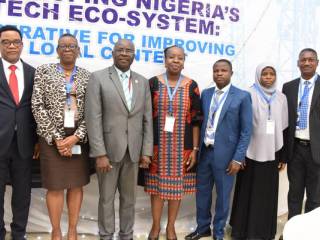The Nigerian Communications Commission (NCC) has been described as an exceptional organisation because of its approach to strategic collaboration and partnership and particularly for expressing a perceptive understanding of the concept of development.
This expression is evident in NCC’s culture of inclusion – consultation and participation of stakeholders in its programmes and projects – which is in line with the reigning paradigm of development.
Professor Adesola Aderounmu, the Dean, Faculty of Technology at Obafemi Awolowo University, Ile Ife, stated this yesterday at a forum organised by NCC on Emerging Technologies Research and ICT Innovation which thematically focused on Developing Nigeria’s Technology Eco-System and the Imperative of Improving Local Content. At the two-day event held at the Tayo Aderinokun Hall, University of Lagos, Aderounmu revealed that without any invitation or prompting, NCC staff walked into OAU Ile Ife and engaged the authorities about gaps in the University’s digital transformation programme for which it may require support.
Aderounmu, who is also the President of the Nigeria Computer Society (NCS) appealed to NCC to continue to support critical sectors of the economy especially in the construction of ICT parks. He declared that with the provision of ICT parks on campuses, some students now make up to half a million naira monthly.
The Vice Chancellor of the University of Lagos (UNILAG), Prof. Oluwatoyin Ogundipe, who was represented at the event by Professor Oluwole Familoni, the Deputy Vice Chancellor Academics and Research, noted that UNILAG is mindful of the benefits of innovation and has mandated its students to be as innovative as they can be. He informed the forum that the theme of the University’s conference this year is Artificial Intelligence and called on NCC to sustain its partnership with critical stakeholders.
Ephraim Nwokonneya, NCC’s Director of Research and Development (DRD) had earlier in the opening remarks asked participants see the forum as an expression of the items focused on promoting ICT innovation and investment opportunities, as well as strategic collaboration and partnership in the Commission’s 8-Point Agenda. He said in this context, the objective of NCC is to ensure that ICT and innovation connected to it, fosters sustainable development and advancement in all spheres. Reflecting on the role of Silicon Valley – well-known technology hub – the DRD noted that Lagos is also expected to play such role as the city with the highest number of cluster of technology hubs and expressed conviction that NCC’s vision will also inspire more stakeholders interest in ICT innovation.
The Executive Vice Chairman of NCC, Professor Umar Danbatta, represented by NCC’s Director of Legal and Regulatory Services, Yetunde Akinloye, underscored the centrality of innovation hubs in promoting local content development, and added that NCC initiative is headed in the direction of developing the right framework “to enhance the ability of indigenous companies to maximally explore and exploit local opportunities, as well as remain globally competitive.” Danbatta called on Mobile Network Operators to provide solutions in other vertical areas such as education, health and government services among others by leveraging already available telecom network infrastructure.
In the lead paper presented by Funke Opeke, the CEO of MainOne Cable, she affirmed that the technology eco-system in Nigeria is fast emerging and it is the largest in sub-Saharan Africa alongside South Africa and Kenya but Nigeria cannot be compared with other African countries because of its huge population. In order to prepare for the future, Opeke emphasise the need to be serious about accessing capital, accessibility to broadband, electricity, transportation and other challenges. She insisted that if Nigeria does not want to remain just a consumer there must be a focus on the development of local content.
The Mobile Network Operators, MTN and Airtel, represented at the event, recalled their respective initiatives towards encouraging innovation for social development through local content. Other participants among them many entrepreneurs most of whom are already operating hubs around Lagos, made quite informed contributions and called on Nigerians to innovate and retool in order to be relevant to the digital economy that is rapidly unfolding and creating totally new jobs and challenges. Citing the declaration by the World Economic Forum which revealed that in a few years’ time, the jobs that will exist are not the same as we see in contemporary society. Accordingly, young persons were advised to identify problems requiring solutions and create ICT solutions to address. A popular question repeatedly asked by some of the participants was whether Nigeria is ready for the coming challenges of Internet of Things, Artificial Intelligence, driverless cars and so on.

